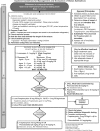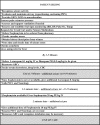Mastery of Status Epilepticus Management via Simulation-Based Learning for Pediatrics Residents
- PMID: 26221431
- PMCID: PMC4512786
- DOI: 10.4300/JGME-D-14-00516.1
Mastery of Status Epilepticus Management via Simulation-Based Learning for Pediatrics Residents
Abstract
Background: Management of status epilepticus (SE) in the pediatric population is highly time-sensitive. Failure to follow a standard management algorithm may be due to ineffective provider education, and can lead to unfavorable outcomes.
Objective: To design a learning module using high-fidelity simulation technology to teach mastery achievement of a hospital algorithm for managing SE.
Methods: Thirty pediatrics interns were enrolled. Using the Angoff method, an expert panel developed the minimal passing score, which defined mastery. Scoring of simulated performance was done by 2 observers. Sessions were digitally recorded. After the pretest, participants were debriefed on the algorithm and required to repeat the simulation. If mastery (minimal passing score) was not achieved, debriefing and the simulation were repeated until mastery was met. Once mastery was met, participants graded their comfort level in managing SE.
Results: No participants achieved mastery at pretest. After debriefing and deliberate simulator training, all (n=30) achieved mastery of the algorithm: 30% achieved mastery after 1 posttest, 63% after a second, and 6.7% after a third. The Krippendorff α was 0.94, indicating strong interrater agreement. Participants reported more self-efficacy in managing SE, a preference for simulation-based education for learning practice-based algorithms of critical conditions, and highly rated the educational intervention.
Conclusions: A simulation-based mastery learning program using deliberate practice dramatically improves pediatrics residents' execution of a SE management protocol. Participants enjoyed and benefited from simulation education. Future applications include improving adherence to other hospital protocols.
Figures
Similar articles
-
Use of a simulation-based mastery learning curriculum for neurology residents to improve the identification and management of status epilepticus.Epilepsy Behav. 2020 Oct;111:107247. doi: 10.1016/j.yebeh.2020.107247. Epub 2020 Jun 27. Epilepsy Behav. 2020. PMID: 32603805
-
Mastery learning of thoracentesis skills by internal medicine residents using simulation technology and deliberate practice.J Hosp Med. 2008 Jan;3(1):48-54. doi: 10.1002/jhm.268. J Hosp Med. 2008. PMID: 18257046
-
Structuring feedback and debriefing to achieve mastery learning goals.Acad Med. 2015 Nov;90(11):1501-8. doi: 10.1097/ACM.0000000000000934. Acad Med. 2015. PMID: 26375272
-
Achieving expert performance through simulation-based education and application of mastery learning principles.Semin Pediatr Surg. 2020 Apr;29(2):150904. doi: 10.1016/j.sempedsurg.2020.150904. Epub 2020 Apr 2. Semin Pediatr Surg. 2020. PMID: 32423593 Review.
-
Simulation-based medical education in pediatrics.Acad Pediatr. 2015 Mar-Apr;15(2):134-42. doi: 10.1016/j.acap.2014.10.010. Acad Pediatr. 2015. PMID: 25748973 Review.
Cited by
-
Evaluation of adherence to pediatric status epilepticus management guidelines in Saudi Arabia.Neurosciences (Riyadh). 2020 Jul;25(3):182-187. doi: 10.17712/nsj.2020.3.20190106. Neurosciences (Riyadh). 2020. PMID: 32683397 Free PMC article.
-
Implementation of LURIES: A New Handoff Tool for Pediatric Residents.Cureus. 2018 Apr 30;10(4):e2558. doi: 10.7759/cureus.2558. Cureus. 2018. PMID: 29974013 Free PMC article.
-
Simulation in Neurocritical Care: Past, Present, and Future.Neurocrit Care. 2019 Jun;30(3):522-533. doi: 10.1007/s12028-018-0629-2. Neurocrit Care. 2019. PMID: 30361865 Review.
-
Epilepsy Education: Recent Advances and Future Directions.Curr Neurol Neurosci Rep. 2019 May 23;19(6):35. doi: 10.1007/s11910-019-0946-7. Curr Neurol Neurosci Rep. 2019. PMID: 31123986 Review.
-
BRAIN-SIM: Leveraging Simulation for Neurocritical Care Education with an Innovative Multidisciplinary Approach.J Intensive Care Med. 2025 Aug;40(8):876-884. doi: 10.1177/08850666251327156. Epub 2025 Apr 21. J Intensive Care Med. 2025. PMID: 40255088 Free PMC article.
References
-
- ACGME Program Requirements for Graduate Medical Education in Pediatrics. https://www.acgme.org/acgmeweb/Portals/0/PFAssets/2013-PR-FAQ-PIF/320_pe.... Accessed December 3, 2014.
-
- Chen JW, Wasterlain CG. Status epilepticus: pathophysiology and management in adults. Lancet Neurol. 2006;5(3):246–256. - PubMed
-
- Barsuk JH, McGaghie WC, Cohen ER, O'Leary KJ, Wayne DB. Simulation-based mastery learning reduces complications during central venous catheter insertion in a medical intensive care unit. Crit Care Med. 2009;37(10):2697–2701. - PubMed
-
- McGaghie WC, Issenberg SB, Petrusa ER, Scalese RJ. A critical review of simulation-based medical education research: 2003–2009. Med Educ. 2010;44(1):50–63. - PubMed
MeSH terms
LinkOut - more resources
Full Text Sources
Medical
Miscellaneous




